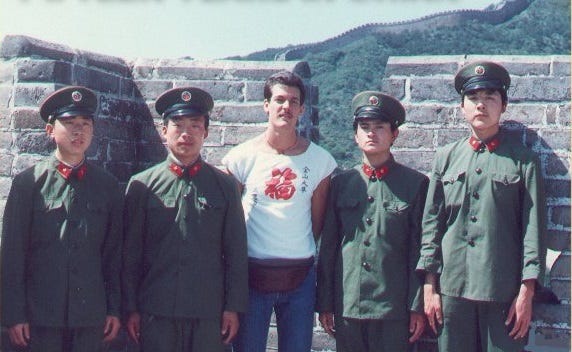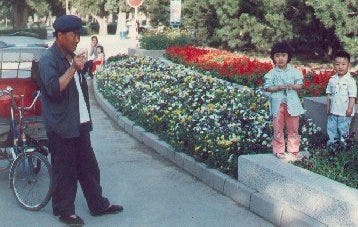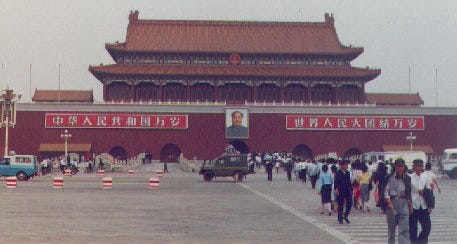Make Chips, Not War
Diplomacy—Old Word, New Applications
The first time I stepped foot onto Red Chinese soil was from the Luo Wu station in Hong Kong. Striding across the famous bridge joining Hong Kong with Mainland China, I noticed a sense of walking back in time.
My First Trip to Beijing
The year was 1985. An American friend came to Taiwan for a couple of weeks and we took a week to visit Beijing. By this time, I had been studying Mandarin in Taipei for a year, and spoke enough to get around. Now, outside the comforts of Taiwan, a visit to Beijing would put my language to the test.
It was a sweltering Canton day. The Luo Hu train station was a short walk from the Hong Kong crossing into a small village called Shenzhen. There was little to nothing in Shenzhen. The one thing that made it special was the crossing from Hong Kong.
I didn’t expect many to speak even minimal English, but felt confident that a dictionary and a good sense of adventure would suffice. We decided to “rough it,” and go it alone.
We walked straight toward the stark redbrick train station. Arriving at the single ticket window, we purchased two tickets to Beijing. The tickets were 硬卧票 hard sleeper tickets. The rest was in the hands of 土地神 the land gods.
After boarding the train, we found our sleeper compartment. There were six bunks to a compartment. Chinese travelers occupied the other four.
As the train departed the platform, we settled in for the 36-hour trip from Shenzhen to Beijing—from South to North China.
The Chinese passengers were interested in our every move. Mostly, not expecting us to speak Mandarin, many greeted us with friendly calls of “ha luo 哈罗!”—a Chinese version of “hello.”
Throughout the 36-hour train ride, we not only immersed ourselves in the captivating beauty of the passing scenery, but face-to-face interactions with the average Chinese and the New-China entrepreneur.
The New-China Entrepreneur
During the train ride from Shenzhen to Beijing, we met a gentleman from Beijing. He was friendly and not shy. And he promptly hooked up with us, offering to show us around Beijing. He was a superb guide, showing us all the essential sights, and arranging room and board in a state-run guesthouse.
Before traveling to Beijing, we exchanged currency in Hong Kong. We changed US and Hong Kong dollars for FEC 外汇劵, a special currency for foreigners visiting China that was pinned to the US dollar.
Foreigners could not use RMB 人民币—the People’s Currency, although, often when paying for something, the change came back in RMB. The average Chinese would seldom refuse FEC, though they officially frowned on them taking it. Being my initial trip to China, I didn’t know the regulations, nor did I understand the workings of a black market that was alive and well.
Meet the Chinese at what they do best—mobilizing the workforce!
The agreement we made with our “guide” was, he pays for everything and we pay him the same amount—in FEC. A few years later, after moving to Hangzhou for a position at the Shangri-La Hangzhou Hotel, I realized he negotiated a pretty good deal! Early on, changing FEC for RMB on the black market, FEC was worth one and a half to two times its value in RMB.
From the early days of China’s opening to the West, the Chinese, like many others before them, worked hard and diligently to reshape their futures and that of their country. The diligence and hard work have paid off for the Chinese people and nation, not unlike the average person—anywhere, who desires opportunities for a better life. Traditionally, Chinese parents, from both sides of the Taiwan Strait, give up personal comforts to offer their children more opportunities for a better future.
Starting from Taiwan, to Hong Kong, then to Mainland China, I experienced Chinese-based cultural challenges that made little sense to my American ways. Though in each place I lived, I met both people wanting to help, and people looking to take advantage of me for gain.
In fact, in most places I’ve lived and visited, including in my home country, I’ve experienced the same. Humanity is, aside from cultural differences, the same when we consider life’s basics.
Moving Through the Challenges
As someone who experienced Taiwan and China in the mid-1980s, through it all, they always impressed me with the tenacity and hard work in which the average person engaged—and doing so without complaint. They knew what they needed to do, not letting frustrations and emotion derail their efforts.
We can see this tenacity in the Chinese character 忍 rěn, usually translated to English as “persevere.” Yet, it’s not that simple, because in English the word “persevere” carries cultural undertones not found in 忍 rěn, and vice verse. (If you’re interested in knowing more about 忍 rěn, you can access my YouTube video here.)
Engage Healthy Competition from the US Workforce
The recent bill passed by the US Congress to support chip manufacturing in the US is a good start. Meet the Chinese at what they do best—mobilizing the workforce!
It is “exactly what we need to be doing to grow our economy right now,” Biden said in a statement after the vote. “I look forward to signing this bill into law.”
Provocative and unfriendly positions over politics and cultural practices may lack diplomacy and are not conducive to beneficial relations on all fronts. The recent visit to Taiwan by Nancy Pelosi brought with it clearly avoidable rebuke. Considering the views of all involved, working to bridge and moderate may be the most beneficial approach. Brash favor, based on personal inclinations, lacks diplomacy. Diplomacy chooses words—and actions—wisely.
Lesson from Water
In the 道德经 Dao De Jing, the phrase ” 上善若水 the highest goodness is like water,” 老子 Lao Zi reveals the power of softness and implores us to practice the characteristics of water—to adapt, change, and nurture.
Culturally, we may not grasp the value of applying these soft practices spoken of by 老子 Lao Zi. As we more often choose the hard characteristics. Reminiscent of a boulder, poised on a hillside—a warning to anyone questioning our ways—Don’t you dare push me!
Considering we have a strong infrastructure, perhaps it’s time to mobilize the US workforce again, and take back manufacturing. Chip manufacturing is a good start. But don’t stop there. The government should do all it can to support and give priority to businesses who mobilize the US workforce to win a manufacturing challenge with China. While balancing it with friendly and cooperative relations.
Let’s learn to succeed with those with whom we have great opportunity, rather than undermining opportunities with incessant perspective and culture-focused nagging.
The Wisdom of Not Picking a Fight
In the Art Of War, it suggests—”知己知彼百战不殆 Know self, know others, and win all battles.” How can we apply these ideas to improve present challenges, both national and global?
The US military claims understanding the Art Of War by Sun Zi. Yet, as a democracy, we fumble to build collegial relations with the societies and peoples from where the Art Of War spawned.
Why might it be so challenging? Perhaps our cultural practices are comparatively pushy and we read into the push rather than the flow.
Perhaps we don’t truly understand the basics of the Art Of War? Like, how to win a battle without fighting? Do we lack cultural skills to meet East Asian challenges with responses that benefit the United States—in ways we don’t understand?
We could win without a fight if we understand the Art Of War. We would know that taking advantage of good relations holds direct benefit for all involved. Let’s find new ways to improve relations, viewing it as a course of action—a means to an end.
Entitlement is Not Realistic
When we look at nature, we see that all get equal treatment. The sun shines across our planet without favor, and nowhere, outside a flower garden, can we find a flower entitled to any different opportunities than what we see given a weed. Differentiation happens not within reality—but within the human mind. Just as for some, a dandelion is a weed, and for others, a medicine. Which is correct?
Consider—”Know self, know others,” wisdom from the Art Of War. First, learn to better understand ourself—why we act and react the way we do; then learn to understand the same in others. We may realize best practices for working through challenges and gaining direct benefits via softer practices.
We gain much by having good relations with China—the benefits outweigh the losses. When we learn to take advantage of cultural practices, differences, and worldviews held by others as opportunities for winning—ignorance will no longer condemn us to a path of insult and injury.
Ignorance is not an excuse for not doing what is diplomatically correct. Diplomacy is global. It calls us to find common ground—learn to work together, seeking answers to difficult questions—while adjusting for differences. One size does not fit all.
Yet again, “Know self, Know others,” reminds us to work toward better understanding, apply beneficial responses and soft reactions when they bear the highest benefit.
I hope Speaker Pelosi extends greater effort protecting US democracy. How sad indeed if we work harder to protect others and not our own. God forbid an authoritarian nabs our country as she tours the world.
And what do we benefit if we gain the whole world but lose our own? Paraphrased Matthew 16:26.
Todd Cornell is the author of Heart Of China, How Mindfulness Changed My Life.
Check out my personal collection of Cultural Revolution artifacts and more.
Visit the Cultural Revolution Artzeum.












